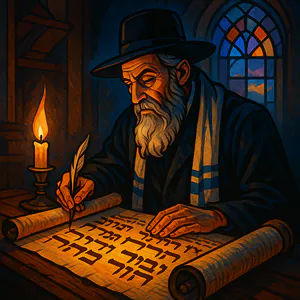Generate Hebrew names
More Real Name Generators- <% result.name %>
Discover all Story Shack apps
Discover the Essence of Your Hebrew Name
Choosing a Hebrew name is a meaningful journey, reflecting identity and heritage. Use these thought-provoking questions to inspire your unique name generation process.
- What qualities do you want your name to embody?
- Is there a personal story or family legacy that resonates with you?
- What emotions or traits do you hope your name will evoke in others?
- Are there specific cultural or historical figures you admire whose names inspire you?
- What significance does the meaning of the name hold for you?
Frequently Asked Questions
Explore common queries about the Hebrew Name Generator and how it can help you find the perfect name.
How does the Hebrew Name Generator work?
It generates a variety of Hebrew names based on cultural significance, meanings, and traditional roots with each click.
Can I choose a specific type of name or theme?
Currently, you cannot specify a type; however, you can keep generating until you find a name that resonates with you.
Are the names unique?
The names are randomly generated; you'll discover a diverse selection with unlimited clicks, though some may be similar.
How many names can I generate?
You can generate an unlimited number of names; simply click 'Generate' as many times as you wish.
How do I save my favorite names?
You can easily copy a name by clicking on it or use the heart icon to bookmark it for future reference.
What are good Hebrew names?
There's thousands of random Hebrew names in this generator. Here are some samples to start:
- Ben Sarasohn
- Jared Novokovichi
- Efron Shimoni
- Efrem Somper
- Mitchell Goldberg
- Carmel Baeck
- Elinor Goni
- Amira Ussishkin
- Zohara Pazy
- Gil Jessel
About the creator
All idea generators and writing tools on The Story Shack are carefully crafted by storyteller and developer Martin Hooijmans. During the day I work on tech solutions. In my free hours I love diving into stories, be it reading, writing, gaming, roleplaying, you name it, I probably enjoy it. The Story Shack is my way of giving back to the global storytelling community. It's a huge creative outlet where I love bringing my ideas to life. Thanks for coming by, and if you enjoyed this tool, make sure you check out a few more!























































